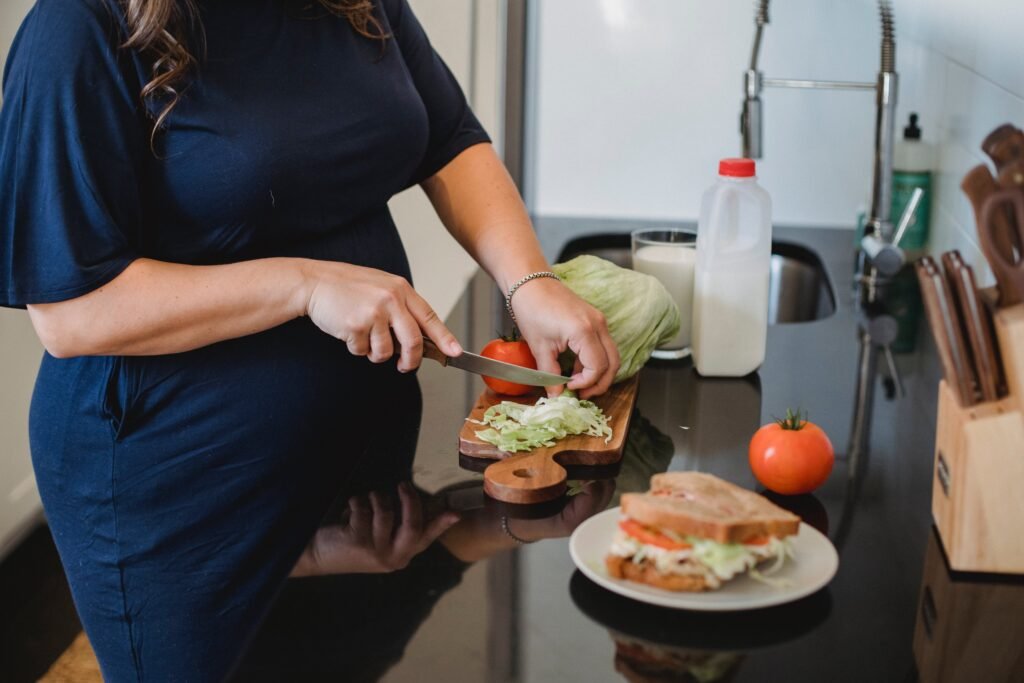During pregnancy, a woman’s body undergoes numerous changes to support the growth and development of a healthy baby. These changes not only affect the mother’s physical health but also her nutritional needs. Proper nutrition is also needed during pregnancy, which is critical for both the mother and the new baby, as it provides the necessary nutrients for fetal growth and development while maintaining the mother’s health.it is too much to understand the importance of a pregnancy meal plans during pregnancy. Nurturing Your Pregnancy with Thoughtful Nutrition. So the importance of Pregnancy Meal Plans plays a vital role in both the mother’s and baby’s health.
Importance of Pregnancy Meal Plans
Supporting Fetal Growth and Development
Nutrition plays a vital role in supporting the best growth and development of the fetus. Important intake of essential nutrients such as folic acid, iron, calcium, and protein is crucial. Folic acid, for example, is essential in the early stages of pregnancy as it helps in the formation of the baby’s neural tube, which later develops into the brain and spinal cord. Iron is necessary for the production of red blood cells and the transportation of oxygen to the developing fetus. Calcium is crucial for the development of the baby’s bones, teeth, and muscles, while protein is needed for overall growth and cell development.
Maintaining the Mother’s Health
The odd people also say that pregnancy places extra demands on the mother’s body, requiring an increased intake of nutrients to support both her health and that of the growing baby. A balanced diet during pregnancy helps to meet these nutritional needs, which not only helps to support the healthy development of the fetus and the mother her own health. A variety of foods rich in vitamins, minerals, and other essential nutrients can help prevent deficiencies and promote overall well-being for the mother.
Managing Weight and Energy Levels
Proper nutrition during pregnancy can also help in managing weight gain and maintaining energy levels. It is important to have a balance between consuming enough calories to support the increased energy demands of pregnancy and avoiding excessive weight gain. Eating nutrient foods such as fruits, vegetables, whole grains, lean proteins, and healthy fats can provide the necessary energy without contributing to excessive weight gain.
Reducing the Risk of Complications
Best nutrition during pregnancy has been linked to a reduced risk of various complications. For instance, consuming sufficient amounts of folic acid can help prevent neural tube defects. Adequate intake of iron can reduce the risk of anemia, while calcium-rich foods can lower the risk of developing conditions such as preeclampsia( high blood pressure disorder that can occur during pregnancy). By nourishing the body with the right nutrients, pregnant women can reduce the likelihood of complications and promote a healthy pregnancy.
Enhancing the Baby’s Long-Term Health
Nutrition during pregnancy not only impacts the immediate health of the baby but also has long-term effects. a mother’s diet during pregnancy can influence the baby’s health and susceptibility to certain diseases later in life. Proper nutrition, including consuming a range of nutrients and avoiding potentially harmful substances such as alcohol and drugs can contribute to the baby’s long-term health and reduce the risk of conditions such as obesity, diabetes, and cardiovascular diseases.
In summary, understanding the importance of nutrition during pregnancy is crucial for the well-being of both the mother and the developing baby. Proper nutrition supports fetal growth and development, maintains the mother’s health, manages weight and energy levels, reduces the risk of complications, and enhances the baby’s long-term health. the importance of a pregnancy meal plan promotes your mother and baby’s growth and development By following a well-balanced pregnancy meal plan and consulting with healthcare professionals, pregnant women can ensure they provide their bodies and their babies with the essential nutrients they need.

Essential Nutrients for a Healthy Pregnancy Diet
During pregnancy, expectant mothers must consume a well-balanced diet that provides all the essential nutrients needed for the healthy growth and development of their baby. so the importance of pregnancy meal plans plays a vital role in a mother’s health. By incorporating a variety of nutrient-rich foods into their meals, pregnant women can ensure that they are meeting their nutritional requirements. Here are some essential nutrients to include in a pregnancy diet:
1. Folic Acid
Folic acid plays a crucial role in the early development of the baby’s neural tube, which eventually becomes the brain and spinal cord. It is recommended that pregnant women consume 600-800 micrograms of folic acid daily. Good sources of folic acid include leafy green vegetables, fortified cereals, beans, and citrus fruits.
2. Iron
Iron is essential for the production of red blood cells and the supply of oxygen to the baby. During pregnancy, the body needs extra iron to support the growing fetus. Pregnant women should aim for a daily intake of 27 milligrams of iron. Foods rich in iron include lean red meat, poultry, fish, beans, spinach, and fortified cereals.
3. Calcium
Calcium is vital for the development of the baby’s bones and teeth. Pregnant women should aim for a daily intake of 1000-1300 milligrams of calcium. Good sources of calcium include dairy products, such as milk, yogurt, and cheese, as well as fortified plant-based bowls of milk, tofu, and leafy green vegetables.
4. Omega-3 Fatty Acids
Omega-3 fatty acids are crucial for the baby’s brain and eye development. Pregnant women should aim for a daily intake of 200-300 milligrams of omega-3 fatty acids, primarily from sources like fatty fish (such as salmon and sardines), chia seeds, flaxseeds, and walnuts.
5. Protein
Protein is essential for the growth and development of the baby’s organs, muscles, and tissues. Pregnant women should aim for a daily intake of around 70-80 grams of protein. Good sources of protein include lean meats, poultry, fish, eggs, dairy products, beans, lentils, and tofu.
6. Fiber
Fiber helps prevent constipation, a common issue during pregnancy, and aids in maintaining a healthy digestive system. Pregnant women should aim for a daily intake of around 25-30 grams of fiber. Good sources of fiber include whole grains, fruits, vegetables, legumes, and nuts.
7. Vitamin D
Vitamin D is essential for the development of the baby’s bones and teeth. It also helps regulate calcium and phosphorus absorption. Exposure to sunlight is an excellent natural source of vitamin D. Additionally, pregnant women can obtain vitamin D from fortified dairy products, fatty fish, and supplements if needed.
8. Vitamin C
Vitamin C is essential for the development of the baby’s bones and teeth. It also supports the immune system of both the mother and baby. Good sources of vitamin C include citrus fruits, strawberries, kiwis, bell peppers, broccoli, and tomatoes.
9. Zinc
Zinc is crucial for fetal cell growth and division. It also plays a role in the development of the baby’s immune system. Good sources of zinc include lean meats, poultry, fish, legumes, whole grains, and nuts.
10. Water
Adequate hydration is crucial during pregnancy to support the baby’s development and prevent dehydration. Pregnant women should aim to drink at least 8-10 cups of water per day.
Foods to Avoid During Pregnancy
During pregnancy, it is crucial to be aware of certain foods that should be avoided to ensure the health and safety of both the mother and the developing baby. While it is essential to maintain a nutritious diet during this time, some foods pose potential risks and should be eliminated from the meal plan. Here are some foods to avoid during pregnancy:
1. Raw or Undercooked Meats and Seafood
During pregnancy, it is important to avoid consuming any raw or undercooked meats and seafood. These can be potential sources of harmful bacteria and parasites such as Toxoplasma, Listeria, and Salmonella. These can cause foodborne illnesses that can be dangerous for both the mother and the fetus. It is advised to opt for fully cooked meats and seafood to lower the risk of foodborne infections.
2. Raw or Unpasteurized Dairy Products
Unpasteurized milk and dairy products should be avoided during pregnancy due to the potential risk of carrying harmful bacteria such as Listeria, Salmonella, and E. coli. Opt for pasteurized dairy products to ensure safety and reduce the risk of foodborne illnesses.
3. Raw Eggs and Foods Containing Raw Eggs
Raw eggs or any foods that contain raw eggs should be avoided during pregnancy as they can carry the risk of Salmonella contamination. This includes foods like homemade mayonnaise, hollandaise sauce, and certain types of salad dressings. Make sure to thoroughly cook eggs to eliminate any potential risks.
4. Certain Types of Fish with High Mercury Levels
Fish is an excellent source of nutrients and omega-3 fatty acids, but it is important to choose fish with low mercury levels during pregnancy. High levels of mercury can be harmful to the developing baby’s nervous system. Fish such as sharks, swordfish, king mackerel, and tilefish should be avoided. Instead, opt for low-mercury fish like salmon, shrimp, and trout.
5. Caffeine and Alcohol
Caffeine and alcohol intake should be limited or avoided during pregnancy. High caffeine consumption has been associated with an increased risk of miscarriage, preterm labor, and low birth weight. Alcohol can lead to fetal alcohol syndrome, which can cause developmental delays and birth defects. It is best to choose caffeine-free beverages and completely avoid alcohol during pregnancy.
6. Unwashed Fruits and Vegetables
To reduce the risk of consuming harmful bacteria and pesticide residue, it is important to thoroughly wash all fruits and vegetables before consuming them. Unwashed produce can potentially carry bacteria such as E. coli and listeria, which can be harmful to both the mother and the baby.
7. Raw Sprouts
Raw sprouts, including alfalfa, mung bean, and clover sprouts, should be avoided during pregnancy as they have an increased risk of carrying foodborne pathogens such as Salmonella and E. coli. It is best to use cooked sprouts as they have a lower risk of contamination.
8. High-Mercury Seafood
Seafood with high mercury levels, such as shark, swordfish, king mackerel, and tilefish, should be avoided during pregnancy. High mercury levels can harm the developing baby’s nervous system. Instead, choose low-mercury fish like salmon, shrimp, and trout that are safe to consume in moderation.
During pregnancy, it is crucial to follow a balanced and nutritious diet. Avoiding these foods will help reduce the risk of foodborne illnesses, contamination, and potential harm to the developing baby. It is always recommended to consult with a healthcare professional or a registered dietitian for personalized guidance on what to eat and what to avoid during pregnancy.
Frequently Asked Questions (FAQs)
1. What is Thoughtful Nutrition?
Thoughtful nutrition during pregnancy involves making conscious and informed choices about foods you eat to ensure you and your baby receive the essential nutrients for optimal health and development.
2. What does a balanced pregnancy meal look like?
A balanced pregnancy meal includes a variety of fruits, vegetables, whole grains, lean proteins, and dairy. This ensures you get a diverse range of nutrients for both you and your baby.
3. How much water should I drink during pregnancy?
Staying hydrated is crucial. Aim for at least eight 8-ounce glasses of water per day, and more if you’re active. Proper hydration supports amniotic fluid, blood volume, and nutrient transport. the importance of a pregnancy meal plan promotes your baby’s growth and development
Proper hydration supports amniotic fluid, blood volume, and nutrient transport. thoughtful nutrition during pregnancy meal plan is a wonderful gift to yourself and your baby so the importance of Pregnancy Meal Plans plays a vital role in both the mother’s and baby’s health. Remember, it is important to consult with a healthcare professional or a registered dietitian before making any significant dietary changes during pregnancy. They can provide personalized guidance and ensure your dietary needs are met for a healthy pregnancy.






